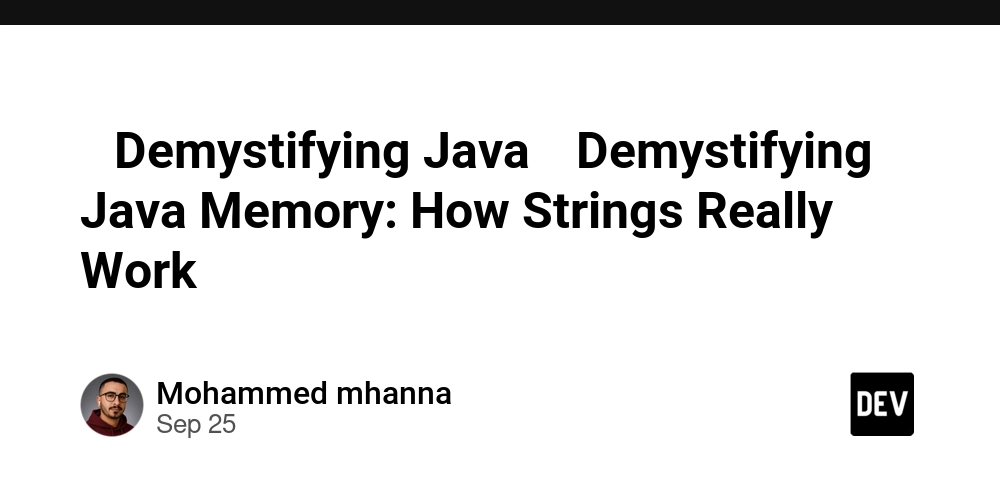Most beginners think a string in Java is just “a bunch of characters.” But under the hood, strings are far more complex. They interact with memory, immutability, performance, and even security.
In this post, we’ll dive deeper into how strings are stored and managed in Java, and why understanding this can make you a better developer.
🌱 Part 1: Strings Are Objects, Not Just Text
When you write:
String name = "Ben";
It may look simple, but what actually happens is that Java creates a String object in memory. Unlike primitive types (int, char, boolean), strings are reference types.
👉 This means name doesn’t store characters directly — it stores a reference (a “pointer”) to where the actual text is kept in memory.
🔒 Part 2: Why Strings Are Immutable
Ever wondered why you can’t change a string once it’s created?
String text = "Java";
text.concat(" Rocks!");
System.out.println(text); // Output: Java
The output is still Java — not Java Rocks!.
Explanation: Strings are immutable. Every time you try to change one, Java actually creates a new String object in memory.
✅ Why immutability matters:
- Thread safety: Multiple threads can safely share strings.
- Security: Prevents malicious changes to sensitive data (like passwords in logs).
- Efficiency: Enables the String Pool (explained next).
🏊 Part 3: The String Pool
Java maintains a special area in memory called the String Constant Pool.
String a = "Java";
String b = "Java";
System.out.println(a == b); // true
Both a and b point to the same memory location in the pool.
But:
String c = new String("Java");
System.out.println(a == c); // false
Here, new String() forces creation of a new object outside the pool.
Why this matters: Using the pool saves memory and improves performance, especially when dealing with many identical strings.
⚡ Part 4: Performance Considerations
Since strings are immutable:
- Concatenating strings in loops is inefficient.
- Solution → Use StringBuilder or StringBuffer:
StringBuilder sb = new StringBuilder("Java");
sb.append(" Rocks!");
System.out.println(sb); // Output: Java Rocks!
Takeaway: Use StringBuilder when doing heavy string modifications.
🔐 Part 5: Strings & Security
Because of immutability, strings can linger in memory until garbage collection. That’s why handling sensitive data (like passwords) with String can be risky.
char[] password = {'s', 'e', 'c', 'r', 'e', 't'};
Using char[] for passwords is safer because you can manually overwrite the data after use.
🧠 Part 6: Strings vs. Character Arrays
It’s easy to confuse String with char[], but they serve different purposes:
String is immutable and powerful for general text handling.
char[] is mutable, better for sensitive or frequently changing data.
char[] chars = {'J','a','v','a'};
String str = new String(chars);
System.out.println(str); // Output: Java
Enforcement: Use char[] when security and mutability are critical, String for everything else.
🧩 Part 7: Garbage Collection & String Lifespan
Since strings are objects, they live on the heap. If no reference points to a string anymore, the Garbage Collector (GC) will eventually clean it up.
But pooled strings (“Java”) may stay alive as long as the class loader is alive.
Takeaway: Be careful when storing too many unique string literals — they can cause memory bloat. For large, temporary text, use StringBuilder or StringBuffer.
🧩 Practice Thought Experiments
Why do you think Java designers chose to make Strings immutable?
What happens in memory if you write this in a loop?
String s = "";
for(int i = 0; i < 1000; i++) {
s += i;
}
Can you spot the difference between using “Java” and new String(“Java”)?
🎯 Wrapping Up
Strings are far more than just text — they’re objects carefully designed to balance performance, memory, and security.
If you understand how Java manages strings:
You’ll avoid memory waste.
You’ll write faster, safer programs.
You’ll unlock deeper insights into how the JVM works.
💬Questions:
Have you ever faced a performance issue caused by string concatenation?
Do you use StringBuilder regularly, or stick with String?
What’s your biggest “aha!” moment about how strings work?



